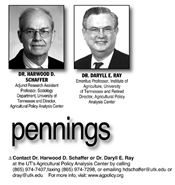|
Congressional Election Results And The Farm Bill

With 2018 Congressional elections in the rearview mirror, a look at the implications the results have for the farm bill is in order.
The shift in the House of Representatives from Republican control to control by the Democrats, may give House Agriculture Committee Chair Mike Conaway an additional incentive to try and shepherd the farm bill through the lame-duck session of Congress. To do that would certainly involve a compromise with the Senate over increasing work and work reporting requirements for SNAP (Supplemental Nutrition Assistance Program – formerly known as food stamps) benefits. The shift certainly gives Ranking Member Collin Peterson and Democrats more leverage in making that change.
The changes to SNAP proposed by the legislation before the House would affect all able-bodied adults 18-59 years old who are not caring for a pre-school child. The rationale for these cuts was made clear by Ag Secretary Sonny Perdue when he told reporters that SNAP was “supposed to be a hand-up, not a continual dependency.”
To continue to receive SNAP benefits, those affected by this legislation would have to engage in a combination of work and job training totaling 20 hours per week beginning with fiscal year 2021. The number of hours per week increases to 25 beginning in fiscal year 2026. In addition, they would have to report their hours on a weekly basis. Those who violate these requirements would lose their SNAP benefits for a year and further violations would result in a 3-year loss in benefits. The reality is that a large number of people receiving SNAP benefits are already employed and would gladly snap up more hours at a higher wage if they were available. With more working hours, they would not need SNAP benefits.
In an Associated Press report by Steven Karnowski (https://tinyurl.com/ydhop9nc), Peterson is quoted as saying, “There isn’t any reason why this thing can’t get done…. The only thing I care about between now and the end of the year is getting this farm bill done.” Conaway has indicated that he, too, is committed to completing work on the farm bill before the new Congress comes into session.
Senate Majority Leader Mitch McConnel has said that one of his priorities for the lame-duck session is the passage of the farm bill. He also indicated that the farm bill will contain a provision legalizing the growing of hemp. With the exception of the WWII period, the growing of hemp has been illegal since the adoption of the Marijuana Tax Act of 1937. Prior to that industrial hemp had been grown in the US since colonial times. Industrial hemp can be used in the production of rope, paper, biofuels, textiles, and a wide range of other products. Hemp could compete with corn, soybeans, and cotton for acreage, providing a short-term boost to crop prices.
Support for limiting SNAP benefits is not limited to the House of Representatives. The Trump administration has also called for additional restrictions on SNAP benefits, raising the possibility that the President might consider vetoing a farm bill without additional limits on the SNAP program. Then again, the President has yet to veto his first piece of legislation.
In addition, if the farm bill is not adopted during the lame-duck session, the House Democrats will enjoy increased leverage over the policies, including SNAP benefits, embedded in any farm bill adopted in the new Congress that will be seated on January 3, 2019. Because rural and agricultural areas overwhelmingly voted for Republicans in the House of Representatives, farmers may find themselves with decreased leverage when it comes to policies like payment limitations, environmental compliance, and other environmental provisions.
Democrats certainly have the incentive to delay the adoption of the farm bill if it contains provisions that they find objectionable.
Barring any unforeseen developments, it seems likely that the SNAP stalemate will be resolved, and the farm bill will be passed by the end of the year. ∆
DR. HARWOOD D. SCHAFFER: Adjunct Research Assistant Professor, Sociology Department, University of Tennessee and Director, Agricultural Policy Analysis Center
DR. DARYLL E. RAY: Emeritus Professor, Institute of Agriculture, University of Tennessee and Retired Director, Agricultural Policy Analysis Center
|
|